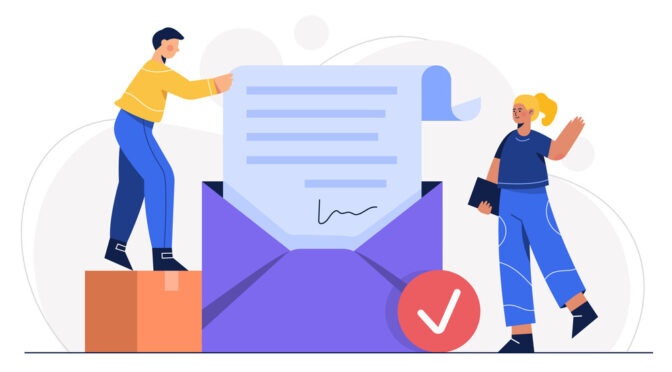The fact that email marketing still remains one of the most effective ways to build quality relationships with leads and customers alone indicates that it’s indispensable for businesses. It is through email marketing that most of the marketing events get started.
For instance, if you are conducting a webinar, you’ll send a series of emails to invite people. Emails will also act as a way of politely thanking everyone who made it to the event.
Clearly, email marketing is the foremost means of healthy communication between businesses and customers. What this means is that your email marketing strategy should be creative and well-thought-out. Putting in half-hearted efforts can result in the loss of valuable deals, which can further translate to slow business growth.

But, the good thing is creating an effective marketing strategy isn’t all that hard if you know all the elements that need to be implemented. This blog aims to tell you exactly that- how to create a kickass email marketing strategy to help you drive more sales.
Start with a broad plan
The very first thing you have to focus on is creating an outline for how things should proceed. Before you start writing emails, it’s imperative to define your audience. This will allow you to target the right people, thereby increasing engagement and conversion rates. You should be aware of the signup sources, as it will help you know at which stage a particular prospect or lead is.
Now that you are clear about your target audience and where they are coming from, think about what kind of content will engage them. For example, if you are selling quirky coffee mugs, the content should be peppy enough to appeal to young people (think about including pop culture references).
But this would be a bad content strategy for a B2B company pitching software. The content in that case should be more professional and to the point.
After this, timing and frequency will come into play. How many emails are you sending to prospects? Are you reaching out to prospects way too often even if they are not responding? Are you reaching out to prospects at the right time? These are all important questions and you need to make sure that you are not misusing your audience’s information.
Email Marketing Strategies
Now, that you have an outline, it’s time to move on to specifics:
1. Personalize your emails
This one is pretty out there, but it’s worth mentioning that without personalized content, email marketing is no good. Understand your prospects and build the content around them. This will ensure two things- firstly, since you have a clear idea of your target audience, you will only reach out to relevant people, and secondly, you will pitch something that interests the prospect.
You are more likely to get positive results by personalizing content and understanding the needs of your audience. But, there’s always a limit to everything, so make sure to not go overboard.

2. Segment your audience
Before you even think about sending emails, you should segment your audience. Why? The answer is quite straightforward- you’ll see higher engagement rates, meaning increased open rates and click rates, and more prospects are likely to respond to your email (which is the ultimate goal of email marketing).
While it may not be possible to segment the audience on all of the touchpoints, go for as many as you can. Geography, timezone, browsing behavior, age, purchasing behavior, and previous engagement rate are some key areas for audience segmentation.

3. Create catchy subject lines
Most of the time, the open rate of an email depends on its subject line. It should be interesting enough to grab the attention of the reader but not misleading. It’s not as easy as it seems, because you have to keep the subject line short. Also, a good idea is to end the subject line with a relevant emoji. In the end, this part will and should test your creativity.
4. Keep your emails mobile-friendly
These days a lot of people use multiple devices for different purposes, and the same is true for checking emails. Therefore, it is highly significant to ensure that emails are mobile-friendly. This especially goes for campaigns where you are including images, videos, product browsing options, gifs, or any other interactive element. If such emails do not have a responsive design, then your campaign may backfire.

5. Conduct A/B tests
A/b testing is an essential step, more so if you are just starting out and haven’t figured out yet what works and what doesn’t. Running an a/b test on your current campaign will give you necessary and detailed insights about the sort of content strategy you should be using, which type of subject line works best, what time is better for sending out emails so that the engagement rate is high, and basically how people respond to different elements in emails.
Trials and errors are part of the game, but you can minimize them if you implement a/b testing right at the beginning.
6. Leverage marketing automation
This is an important one. Marketing automation is essentially a way to streamline your entire campaign. A marketing automation tool will give you insights to improve the content strategy, schedule emails, and follow-ups, and pull out reports that will help you come up with better strategies in the future.
Chances are your campaign consists of drips, and the way to effectively implement those is through marketing automation. You can schedule the entire drip and the tool will take care of whether or not the second or third email should be sent based on the reaction of the prospect.
7. Have a re-engagement strategy in mind
Even if you come up with a cool and effective email campaign, a lot of prospects may not even open your email or the entire sequence. That does not mean your idea was bad. Email marketing works on probability, which means you can’t be sure how recipients are going to react.
Hence, it is a good idea to have a re-engagement plan in place. Ask the prospects if they are interested in your product. You can also conduct a survey, a poll, or ask for feedback. This way you’ll know if the prospects on your list are relevant. If not, you can clean up the list and include people who will convert in the future.
8. Make sure to a send test email
It’s just common sense to send a test email before you launch the campaign. Doing so will let you know about any kinks that you need to take care of. For example, extra spaces, any grammatical errors, font color, and size, whether or not the images or any other elements in the emails are responsive, and so forth.
9. Include an “Unsubscribe” option
If you are not respecting prospects’ privacy and not giving them the option to opt-out, you’re setting yourself up to fail. There are a lot of privacy laws in place these days and rightly so- they protect consumers from any sort of digital fraud. Therefore, you should make sure to not force your service or product on anyone without their consent or approval.
A lot of times it also happens that a person is no longer interested in a product that they might have liked before. They should be able to opt out of your email list easily. This is why you need to ensure that there’s an unsubscribe button and that the email recipients can find it easily.
10. Pay attention to reporting and analytics
After every email campaign, you should ideally review metrics like open rate, click rate, and unsubscribe rate. These reports will help you plan your next email marketing strategy in a better way by showing you how many people you are able to engage. For example, if the unsubscribe rate is high, you’ll know that you have to work harder on the email copy and provide something of value to the recipients.
Moreover, experimenting is the way to find out the new technique that works best. But if you are running a lot of experiments, you also need to stay ahead and keep a tab on what is yielding better results. This is where reporting and analytics come in.
In Closing
Email marketing is the best and most effective way to reach your audience. You are not directly intruding in their lives while making sure that they know you exist and will be at their service when and if the need arises.
Just ensure that you are following all the best practices and reviewing your strategy constantly to get the best results. Also keep in mind that focusing on basics, including content quality and privacy, is important to master email marketing.






